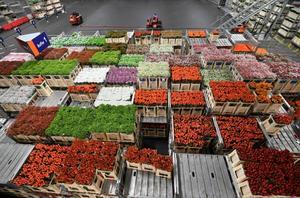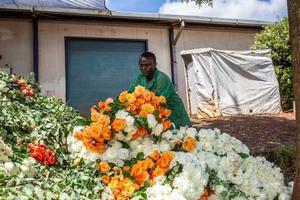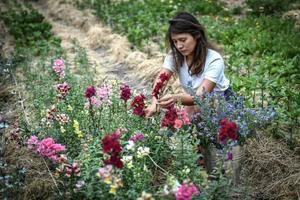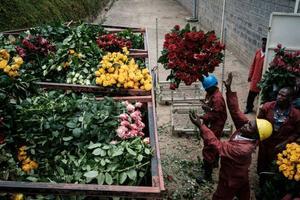In Amsterdam’s suburbs, the forklift trucks have already resumed their incessant loading of crates of flowers as the Netherlands’ horticulture giants get back to deliveries across the globe after the virus lockdown.
Every day, the Netherlands’ massive flower industry sells tonnes of French flowers to French consumers, just one sign of years of Dutch dominance of the globalised market.
But as the pandemic pushes consumers to look more locally, French flower growers are hoping to break Dutch hegemony by selling home-grown produce with less of an impact on the climate as part of the so-called “slow flowers” movement.
Started in the United States as a way to promote local farm and flower produce, the movement is growing as it supports local economies and ethical producers in a shift away from industrialised commerce.
Figures vary, but executives at French affiliate of Dutch giant FleuraMetz estimate 70 percent of the world’s flower production now makes its way through Holland, even produce that is not grown on Dutch soil.
“We sell 30,000 different varieties,” said Michel Van Schie, spokesman for Royal Flora Holland, another Dutch horticulture giant.
The Netherlands’ love of horticulture dates back centuries — and even caused the first stock market crash in the 17th century when speculation over tulip bulb prices caused prices to soar, only to later collapse.
The country’s domination of the market accelerated in the 1950s with the creation of large cooperatives that helped market sales.
The Netherlands “has been able to organise itself to market the flower, by concentrating production, by concentrating logistics, by creating cooperatives which made it possible to facilitate marketing,” said Thierry Louveau, an executive at FleuraMetz’s French unit.
The Dutch state still subsidises energy consumption by Dutch flower greenhouses.
Floral giants
Part of their success has been reliance on relocated production in the southern hemisphere, where growers have access to sun and cheaper labour all year round.
In Kenya, for example, flowers are shipped back to the Netherlands before being distributed to markets everywhere.
In the African country, “the sector directly employs 200,000 people on farms and represents more than a million jobs, supporting four million people,” Clement Tulezi, president of the Kenya Flower Council told AFP.
The Dutch industry has developed an extremely efficient logistics system with trucks criss-crossing Europe, making it difficult for rivals to compete with its floral giants.
“There are flowers produced in France that leave for Amsterdam and return to France,” says Benjamin Perot, one of the co-founders of Monsieur Marguerite, an eco-responsible florist.
The Nice tulip, for example, is produced in the eponymous region in south-eastern France, but can be shipped to the Netherlands where it is evaluated before returning to France, explains Hortense Harang of the “Flowers From Here” association.
Faced with this competition, many French flower growers go out of business or adapt their business model.
The French floral trade association, Val’Hor, estimates that 85 percent of France’s flowers are now imported.
“In 1972, there were 30,000 horticultural farms in France, today there are 3,500,” says Harang.
‘Slow-flowers’
Local French and other European growers now hope to reverse this trend and reduce the industry’s carbon footprint, encouraged by stronger consumer demand for local produce since the COVID-19 pandemic.
“What is emerging from the crisis is still a desire to buy French, a desire to buy local,” Val’Hor president Mikael Mercier told AFP.
The challenge, according to florist Perot, is guaranteeing the produce is 100 percent French, given the competition with Dutch logistics and the ease of access to different products the large cooperatives bring.
By buying from the Dutch market, a florist in Biarritz, southwest of France can have any flower in his shop the next day just at the press of a button, Perot said.
In a bid to counter structural weakness, programmes are being set up in France, as well as in Belgium, Italy and Britain to connect horticulturalists with independent florists, low-carbon distributors who use bicycles or electric vehicles and local customers.
In Britain, which leads the movement in Europe, the “Flowers From The Farm” cooperative brings together producers of all sizes to access British-grown flowers. It now has 800 members, according to its website.
But the breakdown in supply chains caused by the pandemic has highlighted the desire for French-grown flowers more than ever, said Sylvie Robert, director of the association Excellence Vegetale, which is developing the “Flowers of France” label.
“We will reach close to 2,000 engaged companies,” Robert said, saying requests were up to 10 per day from April, compared with just one or two before. “It is not a small boom, but a good big boom.”
Despite the obstacles, French horticulturists such as Masami Lavault are seeing progress in a return to locally-grown produce.
Lavault works on a small-plot cultivation behind the Belleville cemetery in Paris, where she tends to around 200 to 250 species from damascus nigella and cosmos to calendulas.
“We try not to complicate our lives. But for me, it’s very important to have a great diversity,” she said.
Two days a week, Lavault picks her colourful crops that are treated without chemical agents and which she sells to florists and individuals.
“For people, it’s great to be able to come here, to see how it works, to see a field of flowers,” she said. “That’s the purpose of micro-agriculture, to be as close as possible to the people who will consume the product.”
This article was from Digital Journal and was legally licensed through the Industry Dive publisher network. Please direct all licensing questions to legal@industrydive.com.
![]()









